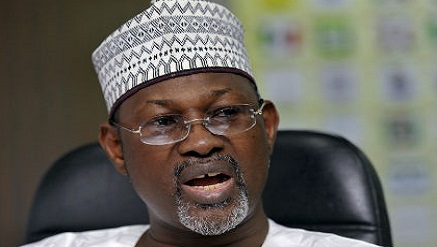General News
No Plans to Sack Jega- Jonathan

President Goodluck Jonathan has restated that he has no plan to sack Attahiru Jega, chairman of the Independent National Electoral Commission (INEC), ahead of the March 28 and April 11 elections.
Speaking in an interview with Aljazeera, President Jonathan denied he was nursing such a plan and said that INEC is a sensitive and important institution and that removing its chairman arbitrarily would spark public outcry.
There has been speculation that the Federal Government was plotting to remove the INEC chairman before the elections.
Jega’s tenure ends in June but there are claims the administration plans to send him on a three-month pre-disengagement leave before the election.
The speculation followed allegations by the All Progressives Congress (APC) and the anti-Jega posturing of the Peoples Democratic Party as well as groups and individuals rooting for President Jonathan.
Last Thursday, senators of the APC, led by George Akume, said they had reliable Intelligence that Jega would be asked to proceed on pre-retirement leave this week through a letter that would originate from the office of the Head of Service of the Federation.
But president Jonathan said that “Except somebody is insinuating that the Chairman has done something wrong. You cannot change an officer, except the person has done something wrong,” Jonathan said in response to a question on Jega.
He added that “Government, whether at the federal or state level, president or governor, does not wake up and change somebody, especially somebody like the INEC Chairman, except that person has done something wrong.
“INEC is a very sensitive body. For me to change INEC Chairman Nigerians will ask questions. So, you cannot wake up and change INEC Chairman.”
He added that he had never discussed with “any human being on earth about changing INEC Chairman”.
Meanwhile, the House of Representatives yesterday passed a resolution warning the federal government of imminent danger that will lead to break down of law and order if the chairman of the Independent National Electoral Commission (INEC), is removed from office before the March 28 presidential poll.
The House at plenary presided over by the Speaker Aminu Waziri Tambuwal, urged the federal government, political class and the security agencies to heed the warning in the interest of the nation, not to interfere with the existing schedules of the general elections.
The House also said it would hold accountable at both domestic judicial forum or at the international criminal court, any person or organisation that foists on INEC any person or action whatsoever, that has the effect of making it impracticable for the election to hold on the 28th March and 11th of April 2015.
A motion under the matters of urgent national importance, moved by Rep Ali Ahmed (APC Kwara), noted that the initial postponement of the general election for six weeks due to the security concerns related to the Boko Haram insurgency has further heightened the tempo for pre-election violence.
He further warned that any alteration to the current arrangement in whatever form including but not limited to illegal removal of the current INEC chairman at this crucial stage would invariably lead to further postponement of the date of election.
He informed the House that already there is documented evidence from several sources that any change in status quo arrangement, especially removal of Jega ” present a possibility of violence” and would occasion the sowing of seeds of a major crisis.
He maintained that the civil society organisations and lawyers including usually reticent senior advocates of Nigeria have sounded “a note of warning” that such removal will be unconstitutional, giving the decision of the Supreme Court that removal of Jega or members of such an independent electoral body as INEC pursuant to section 157 of the constitution can only be achieve when two things happen, either his inability to discharge the functions of the office or for misconduct.
He added that any such deliberate induced violence as it did in 2011 post-election period into widespread or systematic attack, persecution, arson murder, thereby amounting to serious crime of concern to the international community as contained in article 5 of the 1998 Rome status of the international criminal court, to which Nigeria is a signatory.
However, the motion was challenged in a point of order moved by Deputy Minority Leader, Rep Leo Ogor (PDP Delta), who argued that the motion was totally speculative and that it will only bring confusion. He claimed that as it is, nobody is removing Jega as it was reported. His point of order was however over ruled by the Speaker who moved that the motion be read.
General News
NCDC Raises Alarm over Lassa Fever Ravaging 18 States in Nigeria

Nigeria Centre for Disease Control and Prevention (NCDC) has raised alarm over ravage of Lassa fever cases across 18 states and 67 Local Government Areas (LGAs) of the country.

Dr Jide Idris, director-general of NCDC, in statement yesterday, said that Bauchi, Ondo, Taraba, Edo and Benue accounted for more than 80 per cent of confirmed cases recorded during the 2026 peak transmission season.
Idris, described as particularly worrisome the growing infections among healthcare workers, with 28 confirmed cases and three deaths reported so far this season.
NCDC attributed the sustained transmission and rising fatalities to operational gaps at the state level, urging urgent action to strengthen outbreak response and control measures.
According to Idris, field investigations showed most transmissions were occurring in known endemic areas, but weak implementation of established response frameworks had contributed to the continued spread and higher case fatality rate.
He said that gaps identified include infections in general outpatient and maternity settings, poor adherence to Infection Prevention and Control (IPC) protocols, and inadequate pre-positioning of Personal Protective Equipment (PPE).
He added that delayed patient presentation due to financial barriers, inconsistent activation of State Incident Management Systems, weak contact tracing, persistent stigma and poor isolation centre standards were also driving transmission.
Idris emphasised that outbreak response implementation and health service delivery fell primarily under state governments within Nigeria’s federal structure, urging them to strengthen accountability and resource allocation.
He called on affected and high-risk states to urgently activate and closely monitor their Incident Management Systems, ensuring timely coordination and efficient outbreak response at all levels of healthcare delivery.
He also urged the immediate release of response funds, strict enforcement of Infection Prevention and Control (IPC) compliance in public and private health facilities, and continuous availability of PPE and other critical supplies.
The NCDC boss also advocated accelerated financial protection mechanisms to reduce late presentation and high fatality rates, alongside institutionalised rodent control and environmental sanitation measures under a One Health approach.
He advised healthcare workers to maintain a high index of suspicion and adhere strictly to IPC guidelines.
He also urged the public to keep environments clean, prevent rodent entry into homes, store food safely and seek early medical care when symptoms appeared.
Idris noted that Lassa fever was treatable, with improved outcomes when detected early, adding that Nigeria was also responding to other epidemic-prone diseases including Cerebrospinal Meningitis, Diphtheria, Mpox and Cholera.
He reiterated NCDC’s toll-free emergency line, 6232, for reporting suspected cases and obtaining further information
General News
Lagos Deploys Drones, AI to Boost Traffic Response
The Lagos State Traffic Management Authority (LASTMA) has deployed a number of real-time digital solutions, including surveillance drones, GPS-enabled patrol vehicles, and automatic incident detection software.
![]()
The agency has also established a central command and control centre to reduce emergency response times and improve traffic safety throughout Lagos.
According to the agency, the digital transition will replace manual reporting and fragmented coordination with an integrated, data-driven platform capable of instantaneously detecting, verifying, and dispatching responders to crashes and breakdowns.
According to general manager Olalekan Bakare-Oki, LASTMA, body cameras, mobile data terminals, and toll-free hotlines now feed into a unified operations hub that gives real-time visibility of traffic situations across the state.
Incidents detected by digital surveillance are validated in real time and dispatched to the nearest patrol team using GPS tracking, while officers are instructed via modern communication devices.
According to the agency, the system has eliminated delays caused by poor event reporting and logistical constraints, enabling faster diversions, quicker clearance of accident scenes, and better coordination with medical and security agencies.
Field commanders and rescue teams now operate on synchronised data networks, allowing immediate decisions that reduce secondary crashes and prolonged congestion.
According to LASTMA’s 2025 operational summary, the agency rescued 1,075 people from crash scenes, and impounded 17,169 vehicles for various traffic violations across Lagos through its toll-free hotline.
These figures reflect how timely reporting and coordinated response have already reduced secondary accidents and eased congestion, according to the agency.
It went on to it achieved this with the toll-free reporting system, body cameras, and field coordination networks but with the newly deployed suite of smart technologies, the agency’s impact is poised to multiply.
Bakare-Oki said the upgrade aligns with the state’s smart-city agenda, positioning LASTMA as a technology-enabled public safety agency and laying the groundwork for faster, more reliable mobility management on Lagos roads.
General News
Purple Woman 3.0 Is Back, to Empower Women in Tech this IWD 2026

This International Women’s Day 2026, the world is saying “Give to Gain.” PalmPay is turning this message into action by empowering young women with the skills and resources to thrive in today’s fast evolving economy.

The PalmPay Purple Woman 3.0 is a 3-Day Digital Financial & Technology Masterclass created to bridge the gender gap in tech. The program is designed to equip women with practical, job ready skills while also providing job opportunities for career growth.
Launched in 2024, the Purple Woman initiative has impacted 150 women in specialized fields, including Data Analysis, Software Engineering, and Product Management, with learning resources and hands-on skills to launch them into the competitive job market.
From March 5–7, 2026, 100 women aged 18–30 will be selected through a competitive application process to participate in this year’s cohort. Over three immersive days, participants will receive hands-on training from industry experts in digital finance and technology.
And it doesn’t end there.
Ten outstanding participants will secure a 3-6month internship with PalmPay, gaining practical fintech experience that can shape their professional journey.
For participants of this initiative, the Purple Woman Program isn’t just about learning new skills, it’s about building networks, gaining confidence and unlocking bigger opportunities that will positively impact the trajectory of their careers.
For more information about the Purple Woman initiative, visit @PalmPayappng

 E-Financial3 days ago
E-Financial3 days agoIran-Israel-US Conflict and CBN’s FX Gains: A Stress Test for Nigeria’s Monetary Stability

 E-Financial3 days ago
E-Financial3 days agoMutual Benefits Assurance Reaffirms Full Regulatory Compliance, Enhanced Governance

 General News3 days ago
General News3 days agoJAMB Uncovers AI-Driven Fraud Targeting UTME Candidates, Warns Parents

 General News3 days ago
General News3 days agoSERAP Asks FCCPC to Investigate Google, Meta, Others over Alleged Rights Abuses

 Telecom2 days ago
Telecom2 days agoSunil Bharti Mittal Conferred GSMA Lifetime Achievement Award for Transforming Global Telecommunications

 News3 days ago
News3 days agoTeamApt, Awabah Partner to Boost Pension Drive for Nigerians

 News3 days ago
News3 days agoFlashChange CEO, Bidemi Oke, Urges Startups to Build Strong Governance Structures Early

 Telecom2 days ago
Telecom2 days agoWhy Digital Trust Matters: Secure, Responsible AI for African SMEs?


























